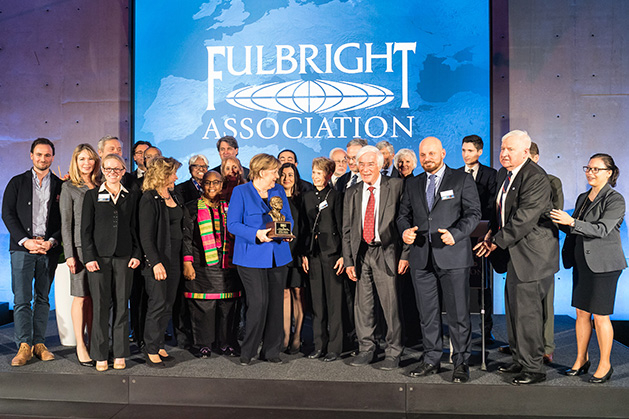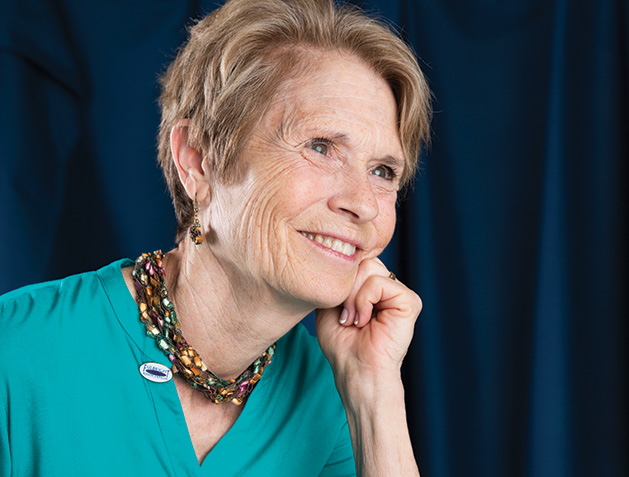
By: Anthony Brousseau
Very few of us, in our lifetimes, will be in the same room as a world leader, let alone speak to one. Even Edina resident Mary Stanton, who has been all around the world as a grantee, alumni and board member of the Fulbright Association, said meeting German Chancellor Angela Merkel was a “once in a lifetime opportunity.”
Earlier this year, Merkel received the Fulbright Prize for International Understanding at a ceremony in Berlin. Stanton, as chair of Fulbright’s Alumni Travel Task Force, was invited to attend the ceremony. She and her daughter Katie, a graduate of Edina High School, sat with hundreds of others as the prize was awarded, for the first time in its history, outside of the United States.
Berlin’s AXICA Congress and Convention Centre, which Stanton describes as “right across the street from where Merkel works,” hosted the event. According to Fulbright’s website, Merkel was awarded the prize “for her remarkable, compassionate leadership and her strong commitment to mutual understanding, international cooperation, and peace.”
The Fulbright Prize for International Understanding has been given out since 1993 “to recognize outstanding contributions toward bringing peoples, cultures, or nations to greater understanding of others,” according to the website. Merkel joins a list of recipients that includes Nelson Mandela, Jimmy Carter and Bill and Melinda Gates.
The ceremony began with a brief presentation on the history of the award, including mention of those esteemed recipients.
“I think that seeing that history of it and seeing who else received the prize helped Merkel understand and see the importance of it, the significance of it, and also her place in history and in the world in terms of really outstanding leaders,” Stanton says.
After speeches by CNN anchor Christiane Amanpour, Executive Director of the German-American Fulbright Commission Oliver Schmidt and German Fulbright alumnus Manuel Pauser, Merkel herself spoke, and Stanton says the chancellor clearly appreciated the gravity and gravitas of the award.
“Merkel, she’s a really gracious woman, a really appreciative kind of woman. I don’t think she’s forgotten what her history is,” Stanton says. “I don’t think she’s forgotten that she’s the daughter of a priest, a pastor. I don’t think she’s forgotten what it was like to grow up in East Berlin. Very, very appreciative, thanked a lot of people, more than once, for coming such a long distance.”
Merkel’s speech touched on topics like the need for compromise, the historical relationship between Germany and the United States and the need to actively fight against the rising tide of nationalism across the world. Mostly, though, Stanton says, Merkel talked about people.
“She emphasized the importance of getting to know people and their differences and then how that creates an understanding and a trust,” she says. “You can have nations promote peace and international understanding, but it’s actually the people, at the level of people that it happens.”
When Merkel’s speech ended, it was time for pictures. “I was fortunate enough, when it was time for our pictures to be taken, to be standing next to her,” Stanton says. “Oh, wow. She turns around and says hello and I just thanked her. I mean, it wasn’t a big long conversation, I just said, ‘Thank you for everything you’ve done,’ and she said, ‘Well, thank you.’ Very down to earth. And appreciated it.
“I just really admire her. I think she’s very gracious, very humble. She’s just not full of herself.”

Stanton’s involvement with the Fulbright Association, whose mission is "promoting scholarship, collaborative engagement, and cultural diplomacy throughout the global community," began when she was a teacher at Richfield High School and applied for an exchange program. She was matched with a teacher in India and lived and taught in the country for six months.
“An incredible experience, a very growing experience. Love the people. Had challenges adjusting to a different way of life and navigating my way around and so on and so forth,” she says.
“It wasn’t just seeing a place superficially, it was actually living there for an extended period of time.”
Stanton has also traveled to Vietnam, Albania, Serbia and Guatemala as a Fulbright representative, and she says those trips have taught her as much about the U.S. as the countries themselves.
“We’re really quite fortunate in the United States,” she says. “I really learned how we have social mobility and we have a lot of freedom and we have a lot of accountability.
“But I learned some negative things, too. I don’t think Americans are interested in visiting people from other countries. I think we’re kind of nonchalant about it.”
Perhaps therein lies the value of the Fulbright Association and their many opportunities for international exchanges of cultural customs and ideas. Aside from her duties as Travel Task Force chair and board member, Stanton hosts Fulbright exchange program members, who she calls her “Fulbright daughters.”
“I just love doing it,” she says. “It’s giving back for what other people did for you, but you also—it’s like a lot of volunteer work, you feel like you get more out of it than you give.”
You can learn more about the Fulbright Association and its many travel programs and opportunities on their website.









